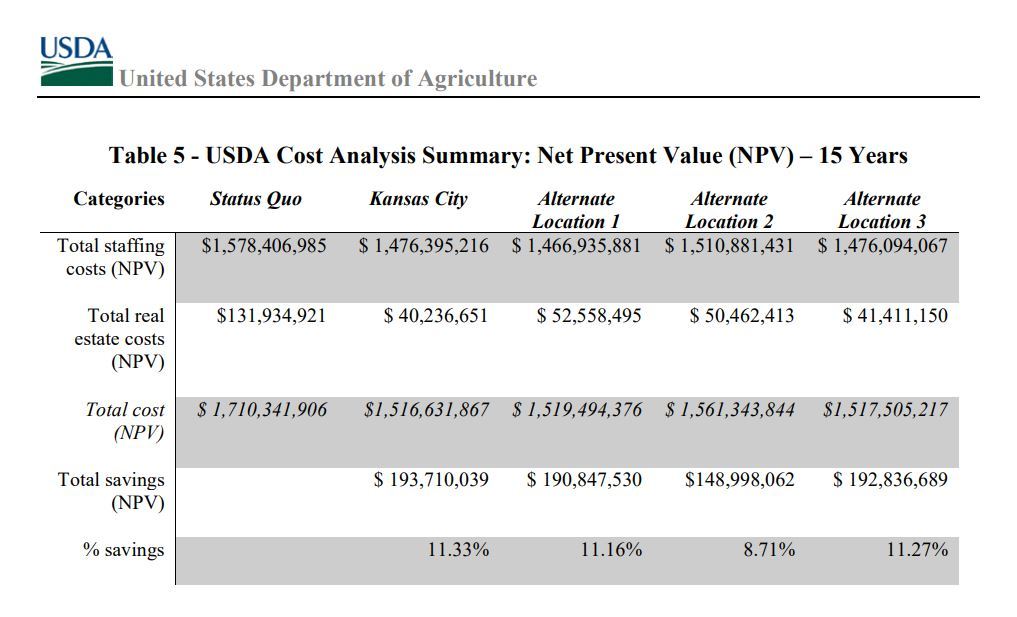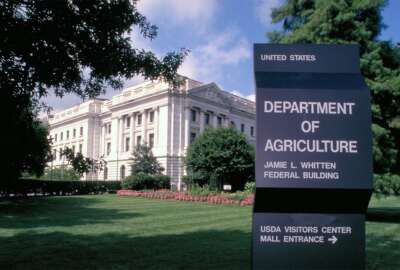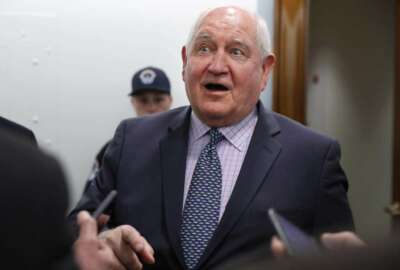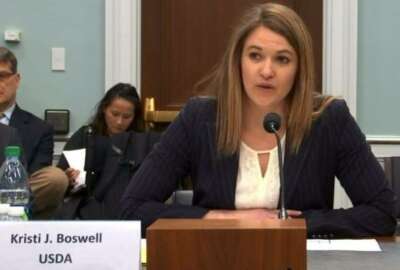
Perdue makes final site selection for USDA relocation
Agriculture Secretary Sonny Perdue said the USDA relocation will save government $300 million over 15 years. About 100 employees are expected to move out of the...
Nearly one year after the Agriculture Department announced its intention to move two subcomponents to a new location outside of the national capital region, employees at last know where they may be packing bags.
USDA will relocate the majority of its employees at the Economic Research Service (ERS) and National Institute of Food and Agriculture (NIFA) to the Kansas City region, the department’s secretary, Sonny Perdue, announced Thursday morning.
The move to Kansas City will save government nearly $300 million over 15 years, Perdue said. The department expects it will save $19 million in staffing and rent costs as early as fiscal 2021.
Of NIFA’s 315 positions, 294 employees will relocate to Kansas City and 21 will remain in the national capital region. Of ERS’ 329 positions, 253 will relocate and 76 will stay in the Washington area.
Employees will receive their reassignment letters by the end of Thursday.
“I want to make sure that this transition and the coming months are as smooth and as minimally disruptive as possible,” Perdue said Thursday in a letter addressed to employees. “None of this reflects on the jobs being done by our ERS or NIFA employees, and in fact, I frequently tell my cabinet colleagues that USDA has the best workforce in the federal government. These changes are more steps down the path to better service to our customers and will help us fulfill our informal motto to ‘do right and feed everyone.'”
The first 100 ERS and NIFA employees are expected to move to Kansas City by Aug. 1, with an additional 200 scheduled to relocate a month later, USDA said in its cost benefit analysis. All 644 positions are expected at the new location by Sept. 30.
Yet USDA hasn’t named a specific site in the Kansas City region where it expects to position an ERS-NIFA building. The department said Thursday it will work with the General Services Administration to secure a permanent lease space through a competitive process in the Kansas City region.
Perdue said GSA will solicit proposals for a specific site in the region around July 1.
“Interested parties based upon on those who are able to fulfill the specifications will have the opportunity to submit proposals to the General Services Administration,” he told reporters Thursday afternoon. “They will then ascertain the different value levels of those proposals and make the best choice for the venue that we need to be in.”
No ERS or NIFA employee will be involuntarily separated, though most will have to move to keep their jobs. Employees can choose not to relocate, but unless their positions are slated to remain in D.C., they will lose employment with USDA. The department said it will offer relocation assistance to employees who relocate. Employees will receive the same base pay but a new locality pay rate for Kansas City.
Notably, USDA won’t move forward with its original plan to realign ERS under the Office of the Chief Economist. Perdue said he made the decision to keep ERS where it is under USDA’s research, education and economics mission after hearing feedback from members of Congress and other stakeholders.
“It was important for me that employees were the first to hear of this news and that you heard from me personally,” Perdue said in his letter to employees.
Employees may move as early as July
Perdue and other USDA leadership met with ERS and NIFA employees Thursday to discuss the decision and next steps. He reiterated many of the comments he made in his letter to employees and acknowledged the workforce had likely been feeling a lot of stress since USDA first announced its intention to relocate last August.
“I understand this is a real time, immediate and major change for many of you,” Perdue said in the all-hands meeting with employees Thursday afternoon.
When Perdue began to speak, a group of about a dozen employees stood up and turned their backs to him. Several dozen more remained in their seats in the audience.
The department said it will begin offering sessions with HR specialists and small groups of employees starting next week. It will host “experts” from the Kansas City region later in June, who can answer employees’ questions about schools, housing and other program in the area.
Employees’ families can attend these optional sessions as well, said Scott Hutchins, USDA’s deputy assistant secretary for administration.
Employees who decide to relocate can use a “concierge” service, which USDA will offer to help employees find housing, schools and child care service for their families.
USDA employees can move as early as July, Hutchins said. The department already has a building in the region, which Perdue said would serve as a temporary space for ERS and NIFA until USDA can finish the leasing the process.
“We possibly could make space up to receiving 200 employees in the near term,” Perdue told reporters. “We know that some families who decide to relocate want to get there ahead of school starting and those kinds of things. While we would like for our employees to report by Sept. 30, they can do so earlier if that fits their conveniences.”
Thursday’s all-hands meeting lasted 20 minutes.
“I want to thank, again, the workforce of ERS and NIFA for their professionalism [and] the jobs they do. Some have expressed displeasure with this as you might expect, and that’s understandable.”
USDA releases cost-benefit analysis for planned relocation
The final USDA relocation decision comes after the department received 136 expressions of interest back in October. It contracted with Ernst and Young to evaluate the proposals. The department in May unveiled a final three locations, which included the Kansas City region and multiple sites in Indiana and the North Carolina research triangle region.
USDA conducted site visits to the final locations and used a variety of criteria to choose Kansas City as its top choice, Perdue said. It cited Kansas City’s average commute time, affordable housing market and access to other agricultural industrial areas as top reasons for its choice.
The department also received a variety of incentives packages from regions who had expressed interest in hosting the USDA relocation. It didn’t provide many specifics but suggested Kansas City’s offer was the largest and totaled close to $26 million.

USDA’s final site selection came two days after employees at NIFA overwhelmingly voted Tuesday to form a collective bargaining unit with the American Federation of Government Employees. ERS employees voted back in May to form a bargaining unit. AFGE Local 3403 received official certification from the Federal Labor Relations Authority.
Prior to USDA’s announcement Thursday morning, the ERS local issued a lengthy statement that denounced the process by which the agency’s employees were informed of the final site selection — and of the relocation itself.
The union said ERS managers and employees learned from the press that a final site selection announcement would be made.
“Secretary Perdue has stated that his rush to finalize the relocation is an attempt to limit the anxiety and burden on employees,” Kevin Hunt, acting vice president for AFGE Local 3403, said in a statement. “In reality, his announcement today will bring nothing but further burden to the agency with an acceleration of the loss of mission critical staff and senior leadership who cannot or will not move to a new location. Despite the assurance that the relocation is not an attempt to shrink the agency, ERS has been prevented from on-boarding new employees during this time of induced uncertainty.”
ERS, according to a June 5 letter from three Senate Democrats to Perdue and GSA Administrator Emily Murphy, has 66 open positions. NIFA has 88 vacancies, the senators said.
Nearly a dozen Senate Democrats have said they oppose USDA’s relocation, citing concerns with the department’s handling of the leasing process with the General Services Administration and impacts on the ERS and NIFA workforce.
Most notably, the House Appropriations Committee included specific language prohibiting the relocation in its 2020 spending bill, which it advanced to the full House a few weeks ago.
“Certainly Congress can do what Congress does, and we will respect that,” Perdue said when asked about members’ opposition and how USDA might respond if the legislative branch officially blocks relocation. “We’ve done our best to persuade Congress over our reasons and the benefits, and we’ll continue to do that. We obviously hope that Congress will recognize that this is a legitimate executive function.”
“We don’t, at USDA, try to tell Congress how to run their business, and hopefully we will be allowed to complete this move with minimal disruption,” he added.
Several members of Congress in the national capital region on Thursday expressed their opposition to the move.
“The experts at NIFA and ERS need a seat at the table as we work to ensure the food our families eat is safe, but the Trump administration wants to banish facts and science from policy decisions,” Sen. Chris Van Hollen (D-Md.) said in a statement.
Van Hollen introduced standalone legislation that would block the USDA relocation. He said Thursday he would offer the measure as amendment to the annual defense authorization bill this week.
But some outside the national capital region had a different perspective.
“This is a major win for the Kansas City region, and I’m pleased that Secretary Perdue was receptive to our calls to bring these agencies to America’s heartland where they can better serve the communities they were created for,” Rep. Emanuel Cleaver (D-Mo.) said in a statement.
Copyright © 2025 Federal News Network. All rights reserved. This website is not intended for users located within the European Economic Area.
Nicole Ogrysko is a reporter for Federal News Network focusing on the federal workforce and federal pay and benefits.
Follow @nogryskoWFED






